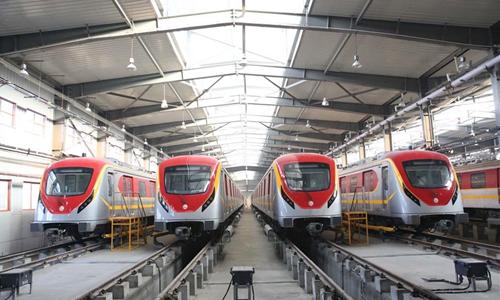China's confidence in CPEC won't be shattered despite setbacks
By Wang Jiamei Source:Global Times Published: 2020/6/29 16:53:45

Trains of the metro train service are seen at a terminal station in Lahore, Pakistan, on December 10, 2019. Pakistan's first-ever mass rapid urban transit train took its first test run on Tuesday after the completion of the physical infrastructure of the project under the CPEC. Photo: Xinhua
Since the coronavirus outbreak in Pakistan, the frustrations experienced during the construction of the China-Pakistan Economic Corridor (CPEC) have received widespread attention. However, the exploitation of these setbacks is nothing but a distortion of the bigger picture and won't affect China's confidence in pushing forward with this large-scale infrastructure plan.
According to a Financial Times report last week, Pakistan is seeking to renegotiate repayment related to CPEC projects after claiming that Chinese and local companies had inflated the costs of some power plant projects.
The report is the latest example of exaggerated problems the CPEC has been facing recently. Other downside risks to the program may also include a CPEC budget cut made by the Pakistani side. According to media reports, Pakistan has reduced its annual CPEC allocation to $159 million in the budget running to June 2021, down about a third from last year, which is expected to affect several CPEC projects.
All these reports suggest CPEC construction is being decelerated due to the economic repercussions of the coronavirus pandemic. That, however, goes against the trend of cooperation in infrastructure development between China and Pakistan.
To be clear, China's willingness and confidence to continue CPEC cooperation with Pakistan has never changed, and the two countries' collaboration in this regard has never been stalled nor slowed. Just last week, China, Pakistan and a Chinese company signed a $2.4 billion deal for the construction of a 1,124-megawatt hydropower project at Kohala, marking the country's largest foreign investment in the power sector. Moreover, Chairman of the CPEC Authority in Pakistan Asim Saleem Bajwa said recently that the pace of work on CPEC projects has picked up, and a great deal of ground work has also been done to launch the second phase.
As a flagship undertaking of the Belt and Road Initiative (BRI), the CPEC will not only allow China to showcase BRI benefits to the world, but will also help Pakistan improve its infrastructure and its people's livelihoods. There is no denying that the coronavirus pandemic has inflicted heavy pain on the global economy, but such economic pressure only underscores the importance and urgency of the BRI projects. Even those who are most critical of the CPEC cannot deny that improved infrastructure and connectivity will boost the regional economy, creating many jobs for the country.
Finally, it is entirely understandable for such a significant program to encounter some problems, and it would be misguided for anyone to assume that China would drop or delay CPEC projects due to such "setbacks." China's confidence in the CPEC won't be affected, and we believe both sides have the ability to address any problems through cooperation.
Posted in: ECONOMY,BIZ FOCUS